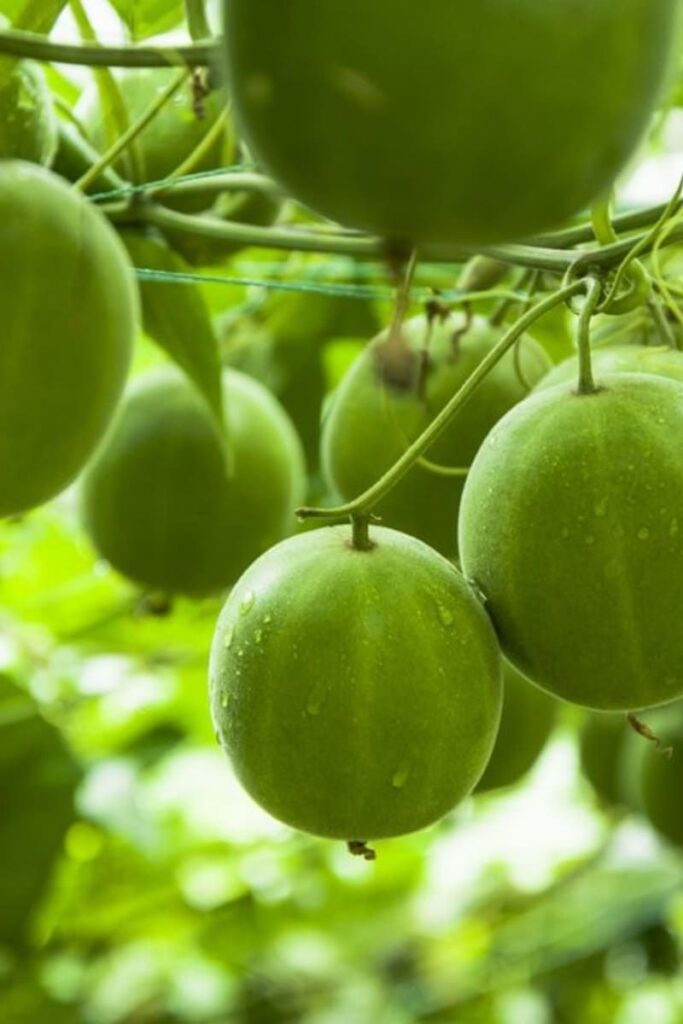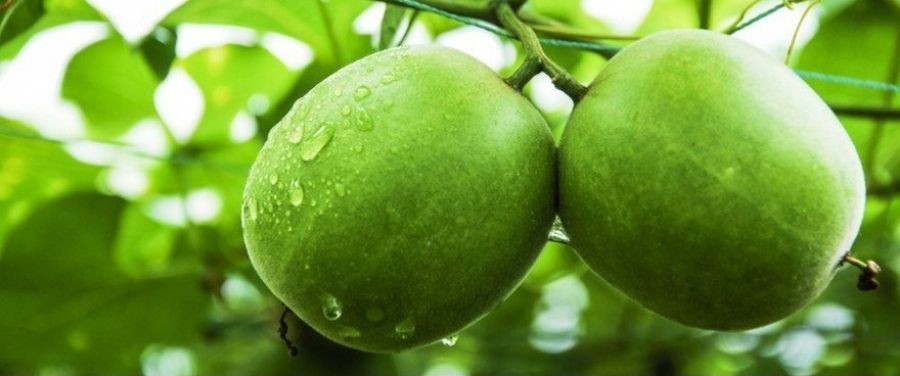What is Monk Fruit?
Monk fruit, also known as Siraitia grosvenorii or luo han guo, is a herbaceous everlasting vine belongs to Cucurbitaceae family. Monk fruit is native to the northern Thailand and southern China.
The vine of monk fruit has a length of approx. 3 to 5 meters. The leaves are of 10 to 20 centimeters long containing narrow—heart shape. The fruit is round in shape and of about 5 to 7 centimeters in diameter. Fruit color may be yellow-brownish or green-brownish.
Monk Fruit Nutrition Value
The monk fruit extracts contain zero carbohydrates, zero calories, zero fiber, zero protein, zero sodium and zero fat. This makes it a well—liked sweetener replacement for the manufacturers who make low-calorie products for their consumers who like to eat them. (SEE ALSO: 11 Fabulous Zero Calorie Foods for Weight Loss)
What is Monk Fruit Sweetener?
The reason of cultivation of this plant is due to its fruit extracts. These fruit extracts (also called mogrosides) help to produce sweetness which is about 250 times more stronger than sucrose. The extracts are low in calorie and has been used in many drinks and traditional Chinese medicine.
The monk fruit is known for its ultimate sweetness, which can be concentrated from the juice of this fruit. Monk fruit contains an excellent amount of various carbohydrates, about 25 to 38 percent, mainly glucose and fructose. Monk fruit sweetener is extracted from Siraitia grosvenorii (monk fruit).

Benefits of Monk Fruit Sweetener
It includes —
Antioxidant Effects:
Many scientific research held on animals suggest that monk fruit extracts may have potent antioxidant properties. But, further research are needed to understand these effects in humans. Also, it is not clear that consuming processed monk fruit sweetener has the same benefits as that of the fruit.
In Weight Loss:
Monk fruit sweetener may help to aid in weight loss. Since it contains almost zero calories, many people believe that it can reduce total calorie intake. However, more studies are needed to prove this.
Anticancer Properties:
According to a research held on animals, mogrosides may inhibits the growth of cancer cells. However, more resarch are needed to prove these benefits.
Prevents Diabetes:
A scientific study held on animals has found that monk fruit extracts may play a vital role in controlling blood sugar levels. An another research states that mogrosides may help to prevent diabetes complications to some extent. However, more research should be done on humans to prove these effects.
Substitutes for Monk Fruit
Monk fruit is a low-calorie sweetener. But, if you don’t have monk fruit sweetener, then don’t worry. It’s OK! For this, you can use other substitutes for monk fruit sweetener such as Stevia or Sucralose.
Stevia is a plant-based sweetener, belongs to the Asteraceae family. Stevia plant is native to Southern America. It has been in use since 16th of century and it 100 times sweeter than that of the sugar. Similar to monk fruit, Stevia is also a zero-calorie sweetener. It doesn’t impact your blood sugar levels and doesn’t cause weight gain. It is commercially available and available in most grocery stores. It comes in both powder and liquid form.
Another substitute is sucralose. However, it is not a natural sweetener but is almost three times sweeter than that of the monk fruit powder. It also has almost zero calories. Sucralose is most commonly sold under the brand name, Splenda.
How to Use Monk Fruit Sweeteners?
Monk fruit sweeteners can be used as an alternative of sugar; such as —
Is Monk Fruit A Safe Sweetener?
Yes! Monk fruit sweeteners are generally safe. There is no sugar in mogrosides, which means that it will not affect your blood sugar levels.
According to the U.S. Food and Drug Administration (FDA), monk fruit sweeteners are considered to be safe. However, more scientific research are needed in this regard.
Monk Fruit Vs. Sugar
Is Monk Fruit Sweetener Better Than Sugar?
A monk fruit sweetener is believed to be better than sugar. Now the question may arise “WHY?”. Lets find out —
The first benefit of monk fruit sweetener over that of the sugar is that monk fruit extracts contain zero calories. It may be a good option for the people who want to avoid calorie intake. In addition, monk fruit extracts contains no carbohydrates, which can make it a great choice for the individuals on low-carb or keto diet.
What’s more, mogrosides or pure monk fruit extracts contain no sugar. It means that its consumption will not affect your blood sugar levels.
Monk Fruit vs. Stevia
Stevia contains almost the same benefits as that of the monk fruit such as zero calories, zero carbohydrates and zero sugar. Stevia leave contains substances, steviol glycosides, which are estimated to be 200 to 400 times sweeter than table sugar.
The main differences between monk fruit and stevia are the cost and availability. This is because, stevia sweeteners are typically more widely available as compared to monk. Stevia sweeteners are less expensive than monk fruit sweeteners because it is difficult to harvest.
REFERENCES:
- Everything You Need to Know about Monk Fruit Sweeteners; By food insight; December 18, 2018.
- Additional Information about High-Intensity Sweeteners Permitted for Use in Food in the United States; U.S. Food and Drugs.
- Structural Analysis of Mogrol and its Glycosides as Inhibitors of Animal DNA Polymerase and Human Cancer Cell Growth; Authors: Mizushina, Yoshiyuki; Akihisa, Toshihiro; Hayakawa, Yousuke; Takeuchi, Toshifumi; Yoshida; Hiromi, Kuriyama, Isoko; Yonezawa, Yuko; Takemura, Masaharu; Kato, Ikuo; Sugawara, Fumio; DOI: https://doi.org/10.2174/157018006776743224.
- Mogrol represents a novel leukemia therapeutic, via ERK and STAT3 inhibition; Author: Can Liu, Yan Zeng, Long-Hai Dai, Tian-Yu Cai, Yue-Ming Zhu, De-Quan Dou, Lan-Qing Ma and Yuan-Xia Sun; PMCID: PMC4473312. PMID: 26101699.
- Anticarcinogenic activity of natural sweeteners, cucurbitane glycosides, from Momordica grosvenori; Author: Midori Takasaki, Takao Konoshima, Yuji Murata, Masaki Sugiura, Hoyoku Nishino, Harukuni Tokuda, Kazuhiro Matsumoto, Ryoji Kasai, Kazuo Yamasaki; PMID: 12893428. DOI: 10.1016/s0304-3835(03)00285-4.
- Antioxidant effect of mogrosides against oxidative stress induced by palmitic acid in mouse insulinoma NIT-1 cells; Author: Q. Xu, S.Y. Chen, L.D. Deng, L.P. Feng, L.Z. Huang and R.R. Yu; PMCID: PMC3854338. PMID: 24270904.
- Antiglycation and antioxidant activities of mogroside extract from Siraitia grosvenorii (Swingle) fruits; Author: Hesheng Liu, Chengcheng Wang, Xiangyang Qi, Jian Zou, Zhida Sun; PMID: 29666541. PMCID: PMC5897311. DOI: 10.1007/s13197-018-3105-2.
- Monk Fruit Nutrition Facts and Health Benefits; By Amanda Capritto, ACE-CPT, INHC; Reviewed by Marisa Moore, RDN, MBA.
